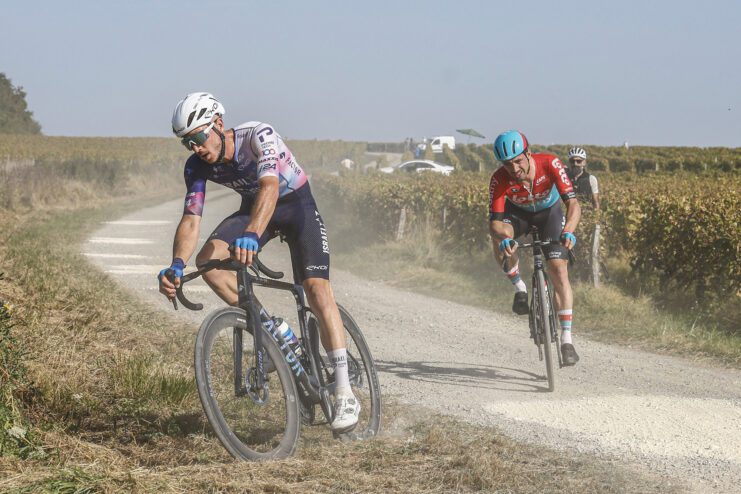The last stage of Tour of Hainan bore witness to a spectacle of resilience and heartache as Israeli sprinter Itamar Einhorn fiercely raced to the finish line, clinching second place after a tight sprint.
However, the triumph was overshadowed by an all-encompassing emptiness, making the result feel distant and untouched.
“I’ve never felt like this before,” Einhorn confessed later. “Of course, I wanted to win. But I didn’t feel anything. There was neither the sting of missing the victory nor a trace of satisfaction from finishing second. The utter sense of triviality weighed heavily on me, knowing that while I raced thousands of kilometers away, my homeland was engulfed in a horrific act of terror and slaughter.”
As the grueling four-and-a-half-hour race unfolded, Einhorn was repeatedly haunted by the images and videos of the atrocities back home since that ominous Saturday morning of October 7, making it one of the darkest days his country has endured. The memory of the hundreds of young individuals, his peers, who were brutally murdered while celebrating at a music festival, and the families slaughtered cold-bloodedly in their homes in the kibbutzim tormented him. “You’re in a race. You’re supposed to disconnect from everything, but how is it possible?” he recounted. “It’s a storm of emotions that you don’t want to, nor can you, escape. I am shattered, but the images from one of the videos that turned my stomach keep haunting me: two children whose parents were murdered before their eyes, and the terrorists leaving a red smear on the walls declaring ‘we don’t kill children’ – while in other houses they executed bound children. And I keep riding, tears overwhelming me. I wonder how this can happen, how much evil and barbarism can be the act of a human being. Then I shake myself and return to the race as the peloton returns to full gas. Until the next moment when things calm down a bit, and I am caught by these horrifying images again.”

This emotional turbulence resonated with the Israeli riders of the team, leaving them torn between the horrendous terrorist attack by Hamas, which has killed almost one thousand Israelis, and their commitment to the team amidst national trauma. Nadav Raisberg candidly shared his ordeal on the eve of the Paris-Tours race, less than a day after the bloody Sabbath. “The first thought was that I couldn’t race. How can one even think about a bicycle race when I am receiving messages about friends fighting there to put an end to this unspeakable slaughter? But after a heart-to-heart with my family, I resolved that breaking down was not an option. On the contrary, I had to do something extraordinary in the race. So, I pushed into a breakaway, hoping to vie for a win, especially on this day. In the end, we clinched victory with the remarkable Riley Sheehan, and my teammates rejoiced rightfully, it was a tremendous achievement. But I couldn’t join in; I couldn’t celebrate with them,” Raisberg reminisced. Similarly, Oded Kogut grappled with the decision to participate in the Under 23 race but eventually chose to stand with his teammates. “It wouldn’t be fair to abandon my friends,” he reflected.

The distance from home exacerbated the emotional distress. Between training and races, constant phone calls and messages connected them to the unfolding tragedy back home. In China, Einhorn and Omer Goldstein found solace in each other’s company, sharing the pain and trauma. “It helped alleviate the distress a little,” said Goldstein, but he also shared how the empathy extended beyond the Israeli riders. “Chris Froome was equally shocked. We talked about the horrific videos circulating online, and he was horrified by what he saw. I guess it’s a sentiment shared by every human being who witnessed the atrocities,” Goldstein remarked.
Labeled as Israel’s “September 11,” the carnage took the lives of several Israeli athletes, including triathletes and cyclists who found themselves in the bloodied zone of the Negev during their routine Saturday morning training rides.
Veteran Israeli rider Guy Sagiv feels that he may very well escaped a similar faith. Accompanied by his partner Omer Shpira, they had come for a short visit to Israel last week, staying at Omer’s family home in Ein HaBesor, near the Gaza border.

“Fortunately, we decided to stay in the north of the country on Sabbath. We set out for training on Saturday morning just as the grim news from the south began pouring in,” Sagiv recalled. In Ein HaBesor, the residents were able to repel the terrorist attack after they invaded the village. Sagiv said: “We were told about the many pairs of bicycles found on the surrounding roads; the fate of their riders still unknown. We know a miracle saved us, but I can’t stop thinking about riders like us who went out for morning training only to be cold-bloodedly murdered and about the hundreds of children and young individuals slaughtered mercilessly. Sometimes, I feel like I’m living in a nightmarish dream, hoping someone will wake me up from it.”

Some Israeli team riders wrapped up their racing season last Sunday, but returning home has proven to be a struggle. The cancellation of numerous flights to Israel left them stranded in Girona, glued to the Tv, waiting for the first chance to journey back to Israel. “The feeling is that our place is there now,” Kogut expressed somberly.















